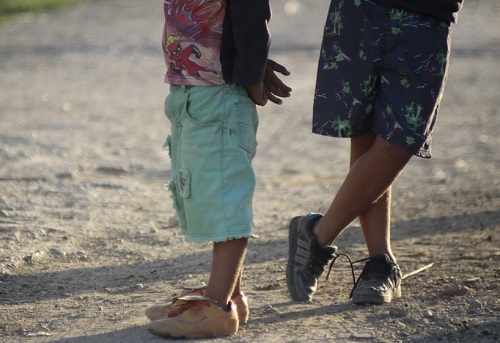Socioeconomic status during the first years of life is critical for education and health in adulthood
Socioeconomic status during the first years of life is critical for education and health in adulthood
Bruno Arpino, Jordi Gumà and Albert Julià, researchers with the Department of Political and Social Sciences, have published an article in PLOS ONE in which they highlight the need for investments that have an impact on children.

Research conducted by researchers at Pompeu Fabra University shows that the situation during people’s first years of life (especially regarding socioeconomic status) has a decisive influence on education, on the life-course trajectory and on health during later stages.
The article, published on 5 April 2018 in the journal PLOS ONE, is by Bruno Arpino, Jordi Gumà and Albert Julià, researchers with the Department of Political and Social Sciences at UPF, in the framework of the European project “Care, Retirement & Wellbeing of Older People Across Different Welfare Regimes” (CREW).
As highlighted by Bruno Arpino, co-director of the Research and Expertise Centre for Survey Methodology (RECSM), “our results suggest that we must back public investments aimed at children, as they are expected to produce lasting effects on people at different stages of their life”.
“We have seen that conditions in early life indirectly affect health during the later years, as a result of their influence on education and on employment and family trajectories”, the researchers claim.
The study examines the extent to which the effects of the conditions during the first years of life on health in adulthood can be explained by educational level and life-course trajectory, a concept which includes such aspects as fertility, personal ties and employment.
A low level of education has a negative influence on health
A section of the results of the study focuses specifically on the importance of education, which the authors consider key, on the indirect effects. “Education is, in particular, the most powerful mediator of the effect of parental socioeconomic status on health”, say the authors.
Specifically, between 66% and 75% of the indirect effects of low parental socioeconomic level in childhood in the three health outcomes considered in advanced age can be explained by educational achievement (for women 86%; 93% for men).
According to the authors, these figures attest “that individuals from poorer families were less likely to achieve high levels of education and, in turn, these low levels of studies negatively influence their health in older age”.
How the level of education and employment and family trajectories jointly affect health
Other results refer to the effect of joint mediation between level of education and family and employment trajectories. In this respect it is notable, in the case of women, between 22% and 42% of the effect of a low parental socioeconomic level in childhood in the three aspects of health considered in advanced age is due to the level of education and the family and employment trajectories. Even higher percentages are observed for men (35% - 57%).
Conversely, the effect of poor health during childhood with regard to poor health in older ages is not significantly influenced by education or life-course trajectory.
Data taken from over twelve thousand people in Europe
The researchers used secondary data (12,034 individuals of 60 years and over) of the Survey of Health, Ageing and Retirement in Europe SHARE), which takes into account 27 European States plus Israel. On the basis of the SHARE data, they used three measures of health: self-perception of health, depression, and limitations in daily activities.
Thanks to the retrospective information obtained, they were able to measure the conditions in the first stage of life (health during childhood and socioeconomic status of the family of origin) and the life-course trajectory. With regard to this last section, complete trajectories of education, fertility and personal links of individuals between 15 and 59 years of age have been reconstructed. The data were processed separately by sex, first with multichannel sequence analysis and analysis of groups, and finally with regression models.
Reference work: Bruno Arpino, Jordi Gumà and Albert Julià (April 2018). “Early-life conditions and health at older ages: the mediating role of educational attainment, family and employment trajectories”. PLOS ONE
